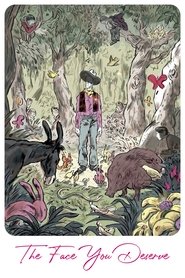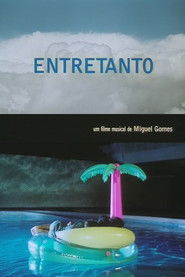detail profile pedro caldas
Peran Yang Di Mainkan Pedro Caldas
 Variations around the texts of the...
Variations around the texts of the...Al Berto, Life Adrift 2017
Variations around the texts of the poet Al Berto (1948-1997). In Al Berto´s work, fiction and autobiography converge into a register of reciprocal contamination – as well as lyricism and narrativity. The poetry served Al Berto as a register and memory aid. Therefore, the view is so important in this work: the act of looking confuses itself here with the writings. Thefore, because Al Berto´s poetry is another way of looking, it calls, requests other images that complement the comprehension of the writings, or if they oppose it, then in this opposition, bring new meanings to the reading.
 In which Scheherazade tells of how...
In which Scheherazade tells of how...Arabian Nights: Volume 2, The Desolate One 2015
In which Scheherazade tells of how desolation invaded men : “It hath reached me, O auspicious King, that a Judge will cry instead of giving out her sentence. A runaway murderer will wander through the land for over forty days and will teletransport himself to escape the Guard while dreaming of prostitutes and partridges. A wounded cow will reminisce about a thousand-year-old olive tree while saying what she must say, which will sound none less than sad !
 Summer of 1982 a beach in the...
Summer of 1982 a beach in the...Civil War 2010
Summer of 1982, a beach in the south of Portugal. Rui and his parents live closed in their worlds, blind to the failure that characterizes them as a family and condemns them to the malaise of survival. Rui will have school exams but he is only interested in music and in the exploration of imaginary worlds that he constantly sketches in drawings. Only Joana seems capable of pulling him out of his autism. The girl's vitality fascinates him.
 Francisco behave I Know its your...
Francisco behave I Know its your...The Face You Deserve 2005
Francisco, behave! I Know it's your birthday, you are thirty now, it's carnival, you've dressed as a cowboy for the school party and you are surrounded by kids you hate. But that's no reason to be so annoying... Francisco, repeat after me: "Up to your 30s you have the face God has given you. After that, you get the face you deserve".
 The film is set in Lisbon...
The film is set in Lisbon...Haircut 1996
The film is set in Lisbon, and tells the story of a day in the life of Rita and Paulo, a Portuguese young couple of the 90's. The fast changing city around them makes them wish to break with all traditions and live the day the get married (only civil marriage) like it is an ordinary day.
 Nino tough but sickly and his...
Nino tough but sickly and his...Blood 1989
Nino, tough but sickly, and his older brother Vicente live in the country with their father. After their father disappears ― we’re never sure why ― murder is suggested. Vicente brings his girlfriend to the house, and a different kind of family is established as the three youngsters grow fiercely protective of each other. But their uncle grows suspicious about the fate of the missing father and forcibly kidnaps Nino, taking him away to the city and leaving Vicente to locate him there.
 Dina Maria Santiago is a teenager...
Dina Maria Santiago is a teenager...Dina and Django 1983
Dina (Maria Santiago) is a teenager brought up by her grandmother, employed as a housekeeper for a fairly well-off family. Since Dina only has her grandmother, she spends her time fantasizing about her life and reading comic-book love stories -- activities that do nothing to improve her dim perspective of reality. Due to these handicaps and her own inexperience, she gets involved with Django (Luis Lucas), a shady character who decides to use her as bait to attract men and then rob them. One day when both are in a taxi with robbery in mind, the driver gets suspicious so Django shoots him, and so does Dina. She escapes and runs away -- though it seems like she has learned too little too late. This story unfolds against a time of upheaval in Portugal (mid-1970s) when the military government is formulating a constitution and social changes are happening everywhere.
 Ana is a young Portuguese girl...
Ana is a young Portuguese girl...Ana 1982
Ana is a young Portuguese girl who lives with her grandmother. Through their relationship, we are witness to the Cycle of Life: Grandmother takes care of granddaughter until granddaughter is obliged to do same for grandmother. The scenes between the two protagonists are counterpointed with impressionistic camera compositions based upon famous religious paintings.
 This film depicts the life of...
This film depicts the life of...Island of Loves 1982
This film depicts the life of the 19th-century Portuguese writer Wenceslau De Moraes by means of nine ancient ballads from China. The writer married a Chinese woman after he left his wife and family to go live in Macao. Later, he moved to Japan where he fell in love with a Japanese woman, staying in Japan for the rest of his life. Mixed in with the career and loves of Moraes is the history of Portugal at home and in its colonies.

 A short time has passed Both...
A short time has passed Both... A love triangle between two boys...
A love triangle between two boys... One night Jorge will meet with...
One night Jorge will meet with... Summer of 1964 The professor Carlos and...
Summer of 1964 The professor Carlos and...
 Lisbon by night through the eyes...
Lisbon by night through the eyes... In Africa during the colonial war...
In Africa during the colonial war... Adaptation of a Portuguese traditional tale...
Adaptation of a Portuguese traditional tale...